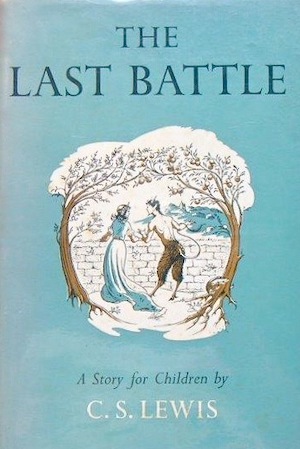I grew up in Christian church and Christian school, and although I was still in grade school when I read the Narnia books, there was one particular piece of theology I knew very well: It’s easy to get to Hell, and hard to get to Heaven.
In fact, the year I read The Last Battle, I was going to a school that taught you could lose your salvation, too. Meaning that if you died at the wrong moment—sometime between messing up and asking for forgiveness—you were still going to Hell, even if you believed in Jesus and had all the right theology and so on.
For me the worst thing about Hell wasn’t the fire and devils and torture forever, it was the thought of not seeing my family ever again. There was a Christian horror film making the rounds at the time called A Thief in the Night and I made the mistake of watching it. There was a scene where all the good followers of God are “raptured” and this little girl comes into her house and hears a teapot whistling and is sure that she’s been “left behind.” That terrified me. Any time the house got too quiet, I was sure it had finally happened.
I was scared. Scared of Hell, scared of God, scared of losing my salvation for doing something wrong. I wrote an essay at my grade school about how you shouldn’t smoke because it’s not worth risking Hell and I got second place. This is the world I inhabited.
My parents—who thought if you received salvation you couldn’t lose it—were concerned about the levels of fear I was putting off, and tried to sit me down and explain not to listen to everything I heard at school, and that to doubt that God would save me was a kind of sin in itself. But it only confused me more, leaving me with a strange theology where I believed that if you prayed to receive Jesus once, that was good. But if you prayed it again, that was a sin because you were doubting God, and therefore God would take away your salvation… Yeah, I was the kid counting whether I was on the even or odd prayer of salvation so I would know if I was getting into Heaven.
As I started reading The Last Battle, even as a kid, I recognized that it was talking about Heaven. The Pevensies (well, most of them) were dead. All the other Narnian characters I cared about were dead. And on the other side of that stable door was a Narnia somehow better and more real than the Narnia they had left. That was, obviously, Heaven. Just like I’d been taught at school and church: it’s the same but better. There’s still food but now it’s all banquets and cups flowing over. We still have roads, but they’re made of gold.
I knew how it would work. Some would make it in and some would not. I was definitely disturbed by the mention of Susan in the book as “no longer a friend of Narnia,” but that fit very well with my theology at the time (and don’t worry! We’re getting to Susan very soon).
I was surprised by the people who managed to get in to the New Narnia. Puzzle, the anti-Christ himself, was somehow in? Some dwarves who didn’t even know they were in the new Narnia, they got in? Shift was rightfully devoured by Tash, as I knew the Calormenes—servants of the evil, false god—would be.
Except then came Emeth.
I loved him…as I think Lewis intended: the noble Calormene who stood up against the evil forces and their false Aslan. I felt a sort of mounting sorrow for him as I saw his end coming. I knew he would be sent to Hell, no matter what I wanted.
But he wasn’t.
I was as confused as Emeth when the Pevensies come across him in the afterlife, and astonished as he began his tale: he had met the great lion, Aslan—big as an elephant and fast as an ostrich. He had been called “my son” by the god of another people, another religion. And Aslan had told him that every good thing he had ever done in the name of Tash had actually been done for Aslan, and any evil thing anyone had ever done in the name of Aslan had actually been done for Tash. So Emeth—who had never met Aslan, had never followed Aslan, had never done any service for Narnia—was in. He was a follower of Aslan without ever knowing it.
I was stunned.
I remember reading it over again. Then again. I had never heard anything like this. It was supposed to be hard to get to Heaven and Emeth had just…stumbled in.
Buy the Book


A Psalm for the Wild-Built
Years later, thinking back on the book, this was the only passage I remembered with any clarity. Not the unicorn, or the grand battle at the end, not the donkey in a lion’s skin. Just Emeth, surprised and pleased to find himself in Heaven. Just because he had tried—as much as he was able—to do the right thing in life and to find what was true.
In fact, Emeth’s name is a Hebrew word for truth (אֱמֶת).
This is the scene that is often brought up when people are wondering if Lewis was a Christian universalist (subscribing to the belief that God will eventually save everyone). Lewis liked the idea—he wasn’t a huge fan of the idea of Hell—but ultimately couldn’t bring himself to believe it.
Lewis talks about this in The Problem of Pain:
“Some will not be redeemed. There is no doctrine which I would more willingly remove from Christianity than this, if it lay in my power. But it has the full support of Scripture and, specially, of Our Lord’s own words; it has always been held by Christendom; and it has the support of reason.”
Like it or not, then, there was only one way to Heaven: through Jesus. But, Lewis points out in Mere Christianity, “But the truth is God has not told us what His arrangement about the other people are. We do know that no man can be saved except through Christ; we do not know that only those who know Him can be saved through Him.”
I’m not the only one to be taken aback by Lewis’s inclusivity. He got letters asking him about it. People wanted to know more about what he meant, that an unbeliever could enter in Heaven. He talked about it in a few of his letters, so here are a couple examples:
I think that every prayer which is sincerely made even to a false god or to a very imperfectly conceived true God, is accepted by the true God and that Christ saves many who do not think they know Him. For He is (dimly) present in the good side of the inferior teachers they follow. In the parable of the Sheep and Goats those who are saved not seem to know that there have served Christ. But of course our anxiety about unbelievers is most usefully employed when it leads us not to speculation but to earnest prayer for them and the attempt to be in our own lives such good advertisements for Christianity as will make it attractive.
And, more directly in reference to Emeth:
The world does not consist of 100 per cent Christians and 100 per cent non-Christians. There are people (a great many of them) who are slowly ceasing to be Christians but who still call themselves by that name: some of them are clergymen. There are other people who are slowly becoming Christian though they do not yet call themselves so. There are people who do not accept the full Christian doctrine about Christ but who are so strongly attracted by Him that they are His in a much deeper sense than they themselves understand. There are people in other religions who are being led by God’s secret influence to concentrate on those parts of their religion which are in agreement with Christianity, and who thus belong to Christ without knowing it.
For me, reading The Last Battle as a kid was the beginning of a new way of looking at God. What if God wasn’t the terrifying tyrant just waiting to shovel people into Hell? What if God wasn’t some cosmic lawyer reading the fine print to find ways to disqualify people? What if, instead, God was like Aslan…someone who loved me. Someone who was generous and kind and forgiving and of course wanting as many people (and animals and dryads and giants) as possible to be in the heavenly kingdom of Narnia-to-come?
Not that all my fear immediately left me, but I found myself asking over and over, “What if it’s C.S. Lewis who is right, and not the people at my school, and not the people at my church?”
There’s a lot more that could be unpacked here, and as an adult I have some complicated feelings and complicated theologies that we don’t need to go into here. There are so many ways that The Last Battle is my least favorite of the Narnia books. I hate what’s done to Susan here. I hate the way the dwarves talk to Emeth, and I hate that Lewis didn’t seem to truly understand the depth of feelings we might experience when he literally killed everyone in the end.
But there’s this other piece—this piece right here—that makes The Last Battle my favorite. It’s the book that untied this knot in me—this unhealthy, evil knot—that said that Aslan was to be followed because he was fearsome and powerful and that bold punishments await those who do not do as he says.
This is the book that taught me that the so-called followers of Aslan who are cruel and unkind, who seek power, build kingdoms for themselves and harm their fellow citizens—even if they do it in the name of Aslan—are in fact offering their vile deeds to someone or something else. That those who are good and kind and trying to do what is right and seeking truth—even if they hold to a different theology—might be on the right path after all.
This is the book that taught me to stop worrying so much and just get to know Aslan.
This is the book that reminds me that if God is good, and loving, and just, and merciful, that it may well be—in fact, must surely be—that he isn’t capricious or cruel about how eternity works.
So I’m thankful for The Last Battle and I’m thankful for Emeth. It’s a theological lesson that I got as a child that I’m still thinking about, still mulling over. And it fills me with both relief and joy to think that when we each make our way through that stable at the world’s end, that—even if “the name of Aslan was hateful” to us—if we have been doing our best to find truth, to do the right thing, to care for the people around us, that we can expect to be greeted by a lion as big as an elephant, fast as an ostrich, with eyes bright as liquid gold in a furnace, beautiful and terrible. And whether we fall down or bury our faces in his mane we can expect to hear that deep and glorious voice say, “Child, thou art welcome.”
 Matt Mikalatos is the author of the YA fantasy The Crescent Stone. You can follow him on Twitter or connect on Facebook.
Matt Mikalatos is the author of the YA fantasy The Crescent Stone. You can follow him on Twitter or connect on Facebook.










